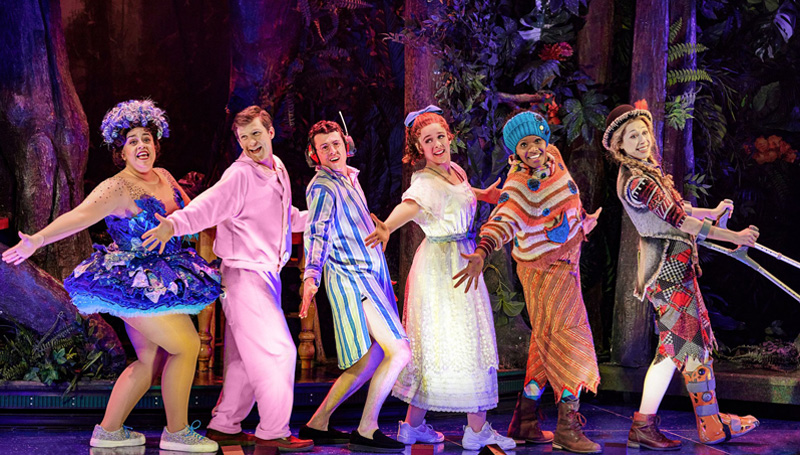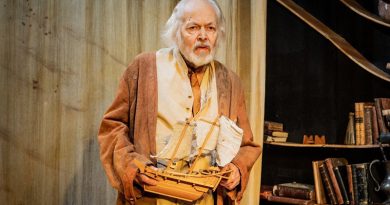“Peter Pan Goes Wrong” at the Ethel Barrymore Theatre
Glenda Frank in New York
4 May 2023
They’re back – the Mischief Production zannis who last brought us the hilarious mishaps of The Play that Goes Wrong with Peter Pan Goes Wrong, J. M. Barrie’s classic as you never imagined it. With their talking dog, pirates, crocodile on a skateboard, and Neil Patrick Harris (guest celebrity through May 7) tossing shimmering fairy dust in the air, they’re better than before. The skewed adaptation by Henry Lewis, Jonathan Sayer and Henry Shields interweaves dozens of comic routines. The trio also delight in braving the physical perils of slapstick and farce.
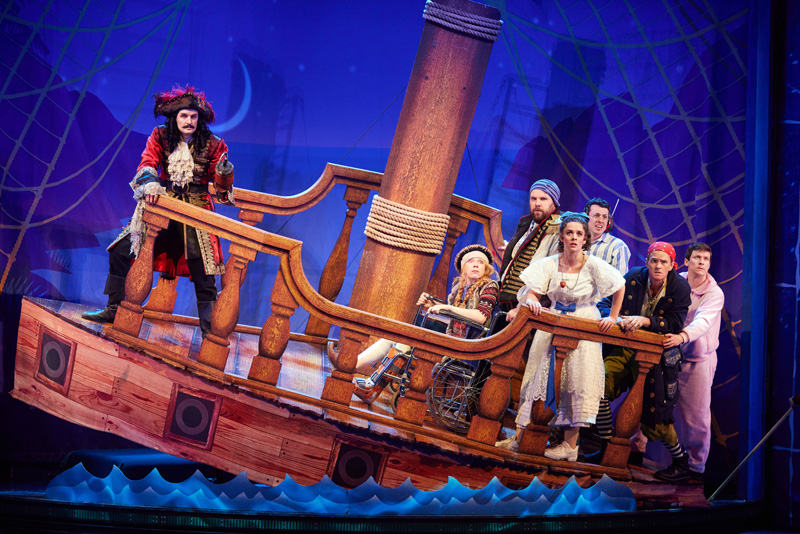
The ensemble. Photo credit: Jeremy Daniel.
There’s lots to be said for the clever (sometimes collapsing) sets (Simon Scullion), costumes redolent of the original Edwardian period (Roberto Surace), adept lighting (Matthew Haskins) and sound design (Ella Wahlström) but the highlight of this production is human interactions. The nimble performers with spot-on comic timing show off their chops in multiple challenging roles.
Firstly, a word about comedy. In 1900 the French philosopher Henri Bergson published Rire, a volume on laughter. Not since the Tractatus Coislinianus, thought to be Aristotle’s lost catalogue of comic techniques, had humour received such rigorous attention. According to Bergson, comedy must be human. When people are not in-the-moment, when they act like machines, we laugh. Repetition, reversals, parody, and bizarre choices are fodder. If we want to write a comic element about animals, they need to remind us of ourselves not our pets. The same goes for talking objects. The power of Peter Pan Goes Wrong is humans striving against forces beyond our control. You can easily sit back and let the comedy wash over you, but the many metaphors give this production unexpected depth.
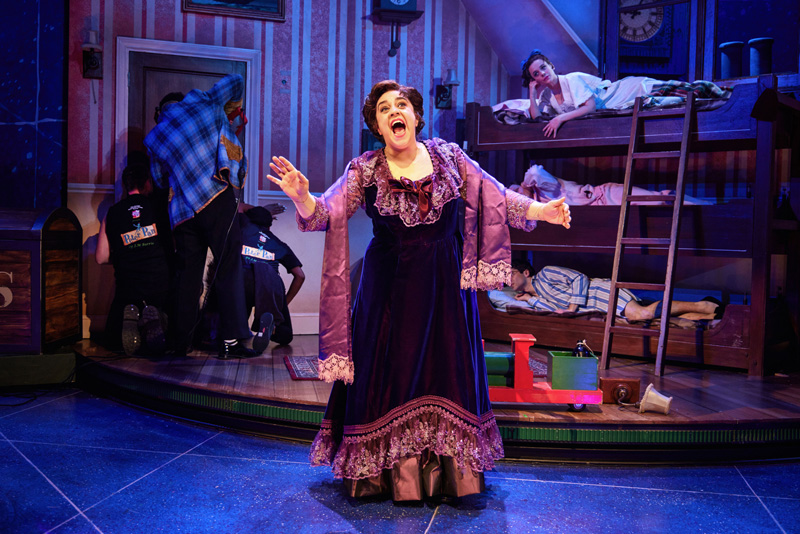
Nancy Zamit (foreground). Photo credit: Jeremy Daniel.
The play is brought to us by the fictional Cornley Youth Theatre. Before the audience lights dim, Robert (Henry Lewis, an Olivier Award winner), the Cornley director, cautions us that Dennis (Jonathan Sayer, also an Olivier Award winner) will be fed his lines through a headset. This leads to his repeating everything he hears, stage directions as well as a couple’s backroom breakup. Lucy (Ellie Morris) is the Cornley director’s niece, who freezes with stage fright. She suffers the most mishaps, but with her leg in a cast and riding a wheelchair, Lucy finally shows off her genius. There are jokes within jokes. The Playbill cast lists the Mischief Company performers by their Cornley Youth Theatre names. And we learn, not surprisingly, that the Cornley “takes talented, enthusiastic and/or available youth” and offers them the opportunity to perform with “near-professional actors.” In other words, they all bumble through.
Lewis plays Nana, the Darling family’s nanny and as such he enters and leaves though the small dog door. Sort of. A portly man, he keeps getting stuck. Although the script and Mr. Darling (Henry Shields) insist he enter the room, the small dog door seems to have shrunk. As he struggles, desperate to perform, other characters enter and leave by the human door which bangs him on the head. Soon, he anticipates the collision. His plight evokes empathy, belly laughs, and metaphor. Much of the show pivots on those powerful reactions. Lewis’ role as Peter’s shadow taps a different humour. Peter (Greg Tannahill) is slim; his shadow is chunky, just a little out of sync and ambitious. As he hogs the scene by stepping in front of the Forever Boy, Peter is forced to mimic him until order is restored. It’s a little bit of the right spice!
Captain Hook is Barrie’s villain, but technology and the technicians are the demons in Peter Pan Goes Wrong. Poor Peter, trying to fly and being hoisted upside down, propelled at speed in the wrong direction, and often flung into the scenery. By the end of the play, he and the stagehand who sometimes stands in for him are wearing bandages around their craniums but are still subject to mishaps. Hook’s hook keeps falling off except when he struggles and struggles to open a bottle of wine. The turntables have a mind of their own. You never know what scenery is going to appear or what prop is going to suddenly vanish.
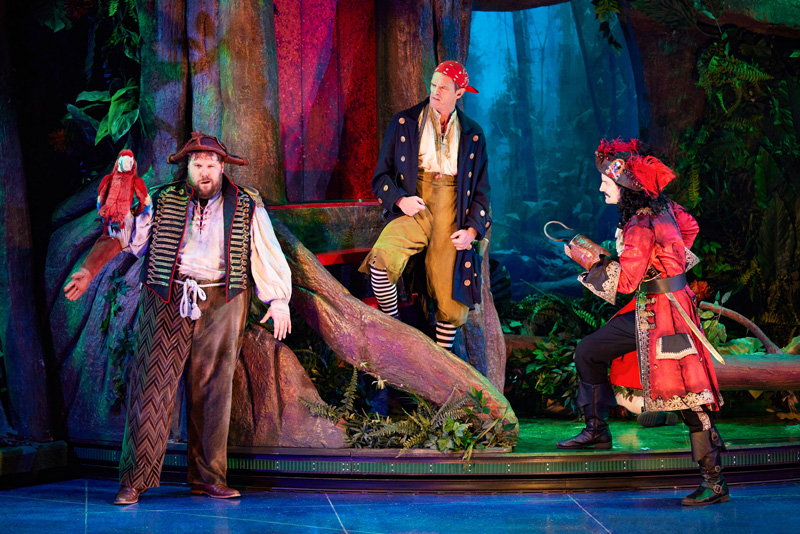
Henry Lewis, Neil Patrick Harris and Francis Shields.
Photo credit: Jeremy Daniel.
And then there is the chair, more like a throne for Neil Patrick Harris as he narrates the story, much like the reader in The Drowsy Chaperone. Harris read, tossed fairy glitter in the air, and the chair glided off stage. Except when it didn’t, about the middle of the play. Once it arrived backwards so that Harris tried to squeeze himself into it and face the audience. Then it began attacking him and soon he was wary every time the chair appeared, but he carried on. At one point it removed his clothes so he reached into his briefs for the fairy dust. Outrageously funny! He too is double cast as a pirate and in the end he’s not just the star performer but one of the working ensemble in their stampede across sets on the racing turntable. I’ve never admired him so much.
Mischief co-founder Nancy Zamit’s blinkingly-fast costume changes between Mrs. Darling and maid Lisa, sometimes just two cues apart, were a high point that kept everybody’s attention. There was never any confusion between the two roles. Later, she becomes a pudgy Tinker Bell, miscast and carrying it off.
As you can hopefully see here, there’s pleasure also in reliving the performance. Everyone will have their own list of favorites. Here’s mine: the actors’ determination to keep the show going despite collisions, collapses and blunders. The wonder of expectation upended by missing objects and rogue technology. The sudden creative bursts. The unexpected heroics and poignancy. And the risk-takers, everyone in the cast as directed by Adam Meggido. Kudos to the Hudson Theatrical Associates for their technical supervision and Adam John Hunter, Production Stage Manager. Creating chaos takes finely honed skills. I have never heard an audience laugh so much and it was gales of sustained laughter.
.
.
~

